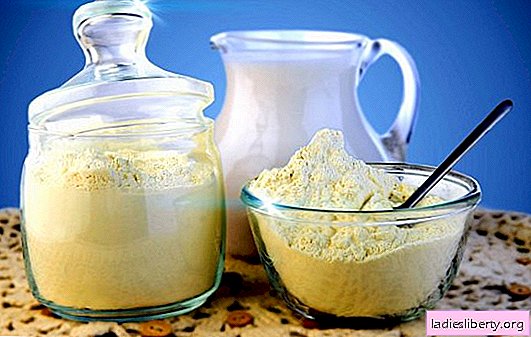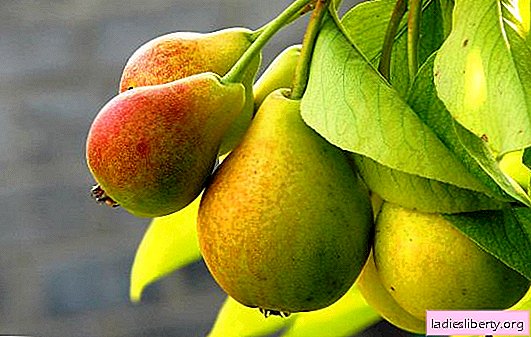
Powdered milk - a powder of white or light beige color - is nothing but a natural concentrate of pasteurized cow's milk. Roughly speaking, milk is without water. Perhaps the vast majority of people consider it if not harmful, then at least useless product. Let’s see what milk powder is in terms of chemical composition, and what is more for human health - good or harm.
The process of obtaining milk powder
Interested in the production of soluble concentrated milk powder back in the 19th century. Different sources call different names of the "discoverers" of the product - the doctor Osip Krichevsky, chemist M. Dirchov. Almost simultaneously, they launched the production of milk powder, the main purpose of which was to create a product with a long shelf life. As you know, natural cow's milk is a very capricious product, lactic acid bacteria ferment it in 48 hours, while dry concentrate can be stored for months. But does milk powder retain all its beneficial qualities?
The first production processes were complex cycles: first, fresh cow's milk was concentrated, and then evaporated at a temperature of 70-80 ° C. The dry powder thus obtained retained all useful dry components and, in diluted form, did not differ in composition from the natural product.
Unfortunately, modern production in the pursuit of profit and cost reduction has significantly accelerated the process by increasing the evaporation temperature to 180 ° C. There is no need to talk about preserving any vitamins after such exposure. But, nevertheless, technology does not stand still, constantly improving. Conscientious manufacturers, taking care of their image, quality of products and consumer health, have learned how to produce milk powder, which has a number of useful properties.
Comparison of the composition of dried and natural pasteurized milk
Natural milk goes through several stages of processing before turning into a dry powder:
· Separation - separation of cream from the bulk:
· Pasteurization (disinfection from microbes at t 86оС);
Thickening (t 55оС);
· Direct spray drying (t 180 ° C).
The resulting dry product retains its beneficial properties for up to 2 years - this is the most important advantage of the powder over ordinary whole milk. Let’s see how its quality is reduced and compare the content of valuable substances in 100 g of reconstituted milk powder and pasteurized whole fat content of the same fat content of 2.5% (the composition of natural pasteurized milk is given in parentheses for comparison):
Calorie content - 48.3% (54%);
Proteins - 2.42 g (2.9 g);
Fats - 2.5 g (2.5 g);
Carbohydrates - 3.93 g (4.8 g);
Vitamin A - 0.013 mg (0.02 mg);
Vitamin C - 0.4 mg (1.3 mg);
Vitamin B1 - 0.01 mg (0.04 mg);
Vitamin B12 - 0.02 mg (0.15 mg), as well as others of this group - В 2, 4, 5;
Choline - 23.6 mg (23.6 mg);
Calcium - 100 mg (120 mg);
Magnesium - 12 mg (14 mg).
In addition, milk powder (as well as whole milk) contains 20 vital amino acids. Heat treatment reduces the content of vitamins, but the mineral components are completely preserved.
Obviously, whole milk is slightly ahead of dry milk in terms of the content of useful components, so it is quite acceptable to replace a natural product with its analogue - milk powder. It is not necessary to boil a drink reconstituted from dry powder, as it is processed and cleaned during production.
What is the benefit ...
When buying milk concentrate, you need to pay attention to the manufacturer. Only a good product, without the addition of soy, flour, powdered sugar, etc. possesses unique useful qualities of the most valuable natural product. The fact that it is used for the preparation of baby food and infant formula for breast milk, which replaces mother’s breast milk, speaks about the benefits of milk powder. Vitamin B12 is indispensable in the treatment of certain types of anemia. The use of milk powder is especially useful for those who refuse meat.
The rich mineral composition - potassium, calcium, magnesium, vitamin D - put milk powder on a par with natural dairy products. It is very convenient to always have a stock of this valuable product in the house.
... and the harm of milk powder
Like any product, especially processed, milk powder can be harmful. First of all, it will not bring benefits to people suffering from allergies to dairy products, since it has the same composition. If the product is of poor quality, produced with non-compliance with GOST, of course, such milk powder will only do harm.
If a precipitate formed during the dissolution of the powder, it means that the manufacturer used poor-quality raw materials or additives. Perhaps there will not be much harm from such a drink, but it will also be of no use.
The quality of the concentrate directly depends on the quality of the initial product. If the herds were grazed in ecologically polluted zones, close to roadsides or near ecologically unfavorable industries, cow's milk is saturated with toxic substances, and the content of toxins in the processed product will increase significantly. Therefore, you should not buy products of any dubious "LLC", because for the sake of profit they can use milk of dubious quality as raw materials.
There are no other contraindications, milk powder is more likely a useful product than a harmful one and it can and should even be used, always observing the rules and shelf life.
The use of milk powder in cooking
The long shelf life of powdered milk makes it very practical: it is used not only as a valuable drink - a source of healthy minerals and vitamins, but is also widely used in cooking, in the manufacture of confectioneries, bakery products, dairy products, various creams, jellies, ice creams. Powdered milk is popular and widely used both at home and on an industrial scale for the preparation of milk porridge, baby food and fortified mixtures, sour cream, cheese, cottage cheese, yogurt.
When milk powder is added to the confectionery dough, a friable, better raw material for baking is obtained. Various creams, pastes, jellies and ice creams get a denser, more saturated texture and are stored for much longer, while maintaining excellent taste. It is very convenient at home to cook fresh homemade cottage cheese or milk cheese.
Often, roller dryers are used to dry milk. Their walls during the production process are very hot, particles of milk powder, in contact with them, are caramelized. Powdered milk acquires a light caramel flavor, smack and cream tint. Such a product is the best suited for the preparation of homemade sweets and sweets, condensed milk, pastille, toffee and many other products. Due to its high fat content, milk powder is an excellent base for making chocolate and ice cream.
Another use of powder is cosmetology. Masks based on it perfectly nourish the skin, rejuvenate, smooth wrinkles.
Milk powder is a valuable and useful analogue of a natural product.











